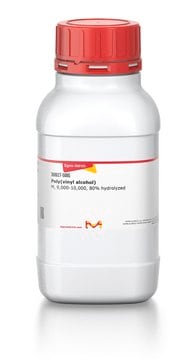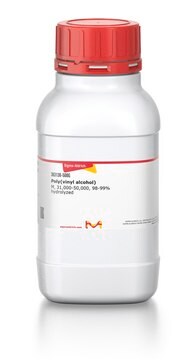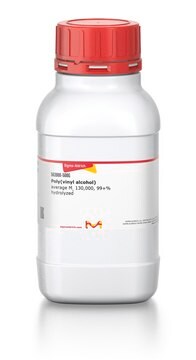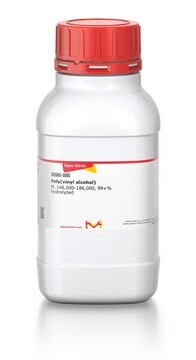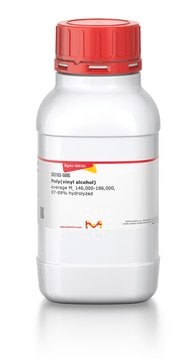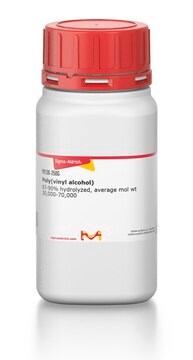10853
Mowiol® 6-98
Mw ~47,000
Synonym(s):
Poly(vinyl alcohol)
Sign Into View Organizational & Contract Pricing
All Photos(1)
About This Item
Linear Formula:
[-CH2CHOH-]n
CAS Number:
MDL number:
UNSPSC Code:
12162002
NACRES:
NA.23
Recommended Products
form
solid
mol wt
Mw ~47,000
extent of labeling
98.0-98.8 mol% hydrolysis
~1,000 polymerization
ign. residue
≤0.5%
viscosity
5-7 mPa.s, 4 % in H2O(20 °C)
InChI
1S/C2H4O/c1-2-3/h2-3H,1H2
InChI key
IMROMDMJAWUWLK-UHFFFAOYSA-N
Looking for similar products? Visit Product Comparison Guide
Legal Information
Mowiol is a registered trademark of Kuraray Europe GmbH
Storage Class Code
11 - Combustible Solids
WGK
WGK 1
Flash Point(F)
No data available
Flash Point(C)
No data available
Personal Protective Equipment
dust mask type N95 (US), Eyeshields, Gloves
Certificates of Analysis (COA)
Search for Certificates of Analysis (COA) by entering the products Lot/Batch Number. Lot and Batch Numbers can be found on a product’s label following the words ‘Lot’ or ‘Batch’.
Already Own This Product?
Find documentation for the products that you have recently purchased in the Document Library.
Customers Also Viewed
Kelly E Coller et al.
PLoS pathogens, 5(12), e1000702-e1000702 (2009-12-31)
Hepatitis C virus (HCV) enters hepatocytes following a complex set of receptor interactions, culminating in internalization via clathrin-mediated endocytosis. However, aside from receptors, little is known about the cellular molecular requirements for infectious HCV entry. Therefore, we analyzed a siRNA
Fusako Kawai et al.
Archives of microbiology, 195(2), 131-140 (2012-12-25)
Scanning electron microscopy (SEM) shows remarkable morphological surface changes in Sphingopyxis sp. 113P3 cells grown in polyvinyl alcohol (PVA) but not in Luria-Bertani medium (LB) (Hu et al. in Arch Microbiol 188: 235-241, 2007). However, transmission electron microscopy showed no
XiaoJun Zuo et al.
Carbohydrate polymers, 92(2), 2181-2186 (2013-02-13)
Novel poly(vinyl alcohol)/citric acid/chitosan (PVA/CA/CHT, PCC) beads were prepared as an adsorbent for the removal of trivalent chromium (Cr(3+)) in aqueous solutions. PCC beads with different mass ratios (I, II, III, IV, V, ad VI) between PVA/CA/CHT were evaluated for
Yani Guo et al.
Journal of environmental science and health. Part A, Toxic/hazardous substances & environmental engineering, 48(5), 518-525 (2013-02-07)
The degradation characteristics of the new mixed strains isolated from a de-sizing process which could degrade PVA thoroughly were studied. The interrelation of seven kinds of single bacterium separated from mixed strains was studied through combination experiments. The degradation process
Bor-Sen Chiou et al.
International journal of biological macromolecules, 55, 214-220 (2013-01-29)
Pollock gelatin/poly(vinyl alcohol) (PVA) fibers were electrospun using deionized water as the solvent and pollock gelatin/poly(lactic acid) (PLA) fibers were electrospun using 1,1,1,3,3,3-hexafluoro-2-propanol (HFIP) as the solvent. The chemical, thermal, and thermal stability properties were examined for the electrospun samples.
Our team of scientists has experience in all areas of research including Life Science, Material Science, Chemical Synthesis, Chromatography, Analytical and many others.
Contact Technical Service

